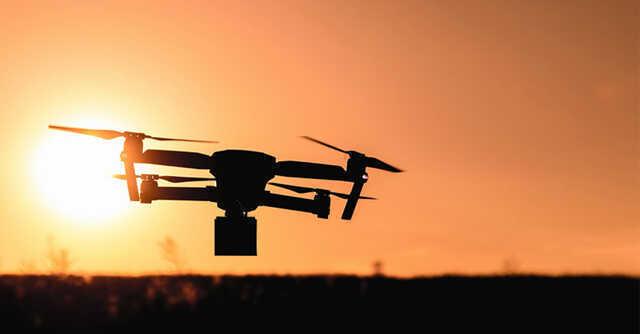
Udaan, TAS end meds drone delivery trial; will July reforms help UAV industry?


Bengaluru-based B2B buying platform for small and medium enterprises Udaan, in collaboration with drone manufacturers Throttle Aerospace Systems (TAS), on Friday completed the trial run of drone delivery of medicines in the city.
Called as the Beyond Visual Line of Sight (BVLOS), the trial run was conducted under the supervision of the Director General of Civil Aviation (DGCA) at a 15 km radius in Gauribidanur, a town in the outskirts of Bengaluru.
It is pertinent to mention here that TAS is India’s first DGCA approved drone maker for civil drones and also possesses a licence to manufacture military drones from the Ministry of Defence.

Udaan said that the pilot successfully tested two drones, the Medcopter X4 and the Medcopter X8.
Each of the drones carried up to 2kgs of payload and the distance for each was in the range of 2-7kms.
The drones were able to cover an average of 3.5 kms in 5-7 minutes, the online platform said.

“The success of today’s trial run opens a massive opportunity to revolutionise customer experience in distribution and logistics space,” Soumyadeep Mukherjee, Product Engineer, Udaan, said.
The trial run is significant in the sense that it opens up the possibility of beyond line-of-sight drones for last mile delivery of shipments, especially in areas with bad road connectivity or areas with heavy traffic/ dense urban settings.
It would also serve as a big boost to kiranas, shop owners, chemists and MSMEs in the country.

Recently in May, the Centre had okayed drone delivery trials of vaccinations by Telangana government, while drone startups such as Skylark Drones, Urbanmatrix technologies, and Ideaforge, among many others raising funds.
What are the current regulations in drone technologies?
India’s first rules pertaining to the manufacturing, operations and manufacturing of drones were the Civil Aviation Requirements (CAR) made public in December 2018.

These rules were replaced by the Unmanned Aircraft System (UAS) rules, earlier in March this year.
However, the new rules also received flak from the nascent Indian drone industry.
The regulations did not allow foreign subsidiaries and entities to become authorised UAS operators or owners, and also complicated the certifications and permissions to manufacture and operate the drones.

Additionally, an alleged attack on an Indian Air Force Station in Jammu on June 27 with the use of explosive devices attached to drones prompted the Ministry of Civil Aviation (MoCA) to release a new set of Drone Rules on July 14.
The new MoCA guidelines reduced the documentations and permissions from 25 to 6, while also reducing fees for certificate of airworthiness, remote pilot license and issuing unique identification numbers, these in a bid to promote local manufacturing of drones.
Along with relaxing some operation requirements for foreign manufacturers and investors, the new rules, published in the Gazette of India erased other certifications compulsory for authorisation such as certificate of airworthiness, unique identification number, R&D of drones in India and remote pilot licenses.

The new rules are expected to ease nerves on the Indian UAV drone market, which according to a report by the research firm marketsandmarkets is expected to touch $1,810 million by 2026, growing at a compound annual growth rate of 14.61% from 2021.
A January 2020 PWC report pegged that the Indian drone market is expected to touch $885 million in the 2021 fiscal.
